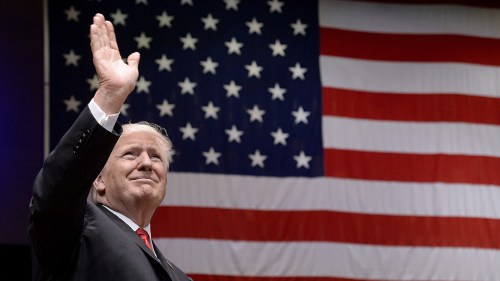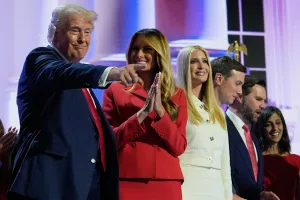Republicans to be more selective in choosing Senate candidates in 2024
Establishment Republicans are looking to play a more assertive role in ensuring their preferred candidates win in competitive Senate primaries as they work to flip the upper chamber next year.
There’s broad consensus that candidate quality factored in to the party’s failure to take back the Senate in last year’s midterms, with a number of controversial candidates endorsed by former President Trump losing in key states like Pennsylvania, New Hampshire and Georgia.
Now, GOP Senate leaders are doing whatever they can to prevent that from happening again in 2024. Sen. Steve Daines (R-Mont.), the current head of the party’s campaign arm, has said he plans to be more active in recruiting candidates and selective in where the National Republican Senatorial Committee (NRSC) sends its support — a departure from his predecessor, Sen. Rick Scott (R-Fla.), who argued it wasn’t his job to interfere in primaries.
In West Virginia, for example, Daines is backing Gov. Jim Justice (R) as he runs against fellow Republican Rep. Alex Mooney in the Senate primary. They’re both vying for the seat held by Democrat incumbent Sen. Joe Manchin, who hasn’t said whether he’s running for reelection.
In Montana, Daines has been supportive of businessman Tim Sheehy, who is challenging incumbent Democrat Sen. Jon Tester, and said he’d prefer to avoid a contentious primary as Rep. Matt Rosendale (R-Mont.) weighs a bid that could potentially tee up an eventual Tester-Rosendale rematch of their 2018 Senate race.
“Senate Republicans have seen the majority slip through their fingers in previous cycles. And they’re so close to regaining the majority, they can taste it. Republicans in 2024 have an opportunity to be on offense, and they’re going to be looking for candidates who can prevail in a general election,” said Jeff Grappone, who led communications for the Senate GOP Conference under Sen. John Barrasso (R-Wyo.), adding that candidate quality “has been an issue” for the party.
“It’s understandable after the last cycle, that there would be a desire to have a different approach, a winning approach, to go on offense and to not leave any opportunities on the table,” Grappone said.
Given the narrow Senate margin, and “given how high the stakes are, I think it’s the right decision for the NRSC to get involved in primaries,” said GOP strategist Matt Mackowiak, although he added that the decision is “not without some risks.”
“A 50-50 Senate could be decisive one way or the other. If you just look at Montana, Ohio and West Virginia, those three — the GOP should be favored in all three of those states if we don’t blow it,” Mackowiak said, noting that states like Arizona and Wisconsin could also be pickup opportunities this time around.
“There’s a pathway to Republicans gaining three or more seats this election cycle, and that would be significant. It’s the most advantageous map, Senate map, in my lifetime for Republicans,” Mackowiak said.
The election handicapper Cook Political Report rates the Senate races for Manchin’s seat in West Virginia, Democrat Sherrod Brown’s seat in Ohio and Independent Kyrsten Sinema’s seat in Arizona as “toss up” states, while Tester’s seat in Montana and Democrat Bob Casey Jr.’s seat in Pennsylvania are among five posts rated “lean Democrat.”
Daines told CBS News last week that the NRSC plans to stay neutral in the Ohio Senate race, where three Republican candidates are now jostling for their party’s nomination in a competitive primary. Ohio Secretary of State Frank LaRose (R) became the latest Republican to announce his candidacy, joining businessman Bernie Moreno and state Sen. Matt Dolan (R).
“When you have three candidates [where] anyone could win the general election, we don’t stay up late at night worrying about that,” the Senate campaign arm’s chair said of Ohio in an interview with CBS News.
“But if we have a situation where a candidate may not be able to appeal across a broader spectrum, that’s where we’ll be more intentional to try to get candidates that can,” Daines said.
But Brian Darling, a GOP strategist and former Senate aide, said establishment Republicans may be setting themselves up for failure by getting involved in primary battles.
“I think it’s a mistake for the party to get involved in primaries,” Darling said. “The party has a mixed record on picking preferred candidates and it doesn’t always work out for them”
Darling added that the party’s involvement in primaries causes rifts between conservatives and the more establishment-wing candidates, creating problems for the eventual general election.
“You end up having these primaries that are pretty, pretty rough-and-tumble, that end up dividing the party and giving ammunition to the Democrats to go after the conservative if the conservative ends up winning,” Darling said.
Darling also raised concerns that the NRSC risks “trying to defeat somebody who may eventually win,” which could then create “a lot of distrust with leadership before these members potentially get elected.”
Other strategists shrugged off that concern, saying those candidates would have to win a general election first in order for that distrust to become a factor.
After a disappointing midterm cycle in which Republicans barely etched out a majority in the House and lost a chance to lead the Senate, many pointed to controversial Trump-backed candidates as at least partially responsible for the failed “red wave.”
Now, some Republicans are saying Trump should stay out of the primaries.
Daines told CBS News that he’s “getting on the same page” with the former president about endorsements and has endorsed Trump in his 2024 bid to get back to the Oval Office.
Darling said endorsements from the former president are “huge” for congressional hopefuls.
“That’s a much more important endorsement than the Senatorial Committee or anybody sitting in the U.S. Senate today,” he said.
CNN reported this week that Trump has told both Mooney in Montana and Rosendale, if he runs in West Virginia, that they’re unlikely to secure his endorsement.
“Certainly, Trump hurt us” in states like Pennsylvania and Arizona last year, Mackowiak said, but it’s “good news” that the former president now seems not to be getting behind “less electable candidates” in places like Montana and West Virginia.
“It appears as though, at least as of now, he’s not going to be the problem he’s been in the past,” the GOP consultant said of Trump.
The party has also appeared to breathe a sigh of relief that some controversial candidates from last year’s midterms are foregoing getting into next year’s races for both the House and Senate.
Pennsylvania’s state Sen. Doug Mastriano (R), who questioned the legitimacy of the 2020 election during his 2022 gubernatorial bid, decided against a 2024 run for Sen. Bob Casey’s (D-Pa.) seat. Endorsed by Trump, Mastriano lost his race last year by 15 points.
Others, though, could still jump into Senate races and complicate things for the establishment, like failed Arizona gubernatorial candidate Kari Lake (R), who is considering an upper chamber bid for Sinema’s seat.
The Hill has reached out to the NRSC for comment.
Copyright 2024 Nexstar Media Inc. All rights reserved. This material may not be published, broadcast, rewritten, or redistributed..













